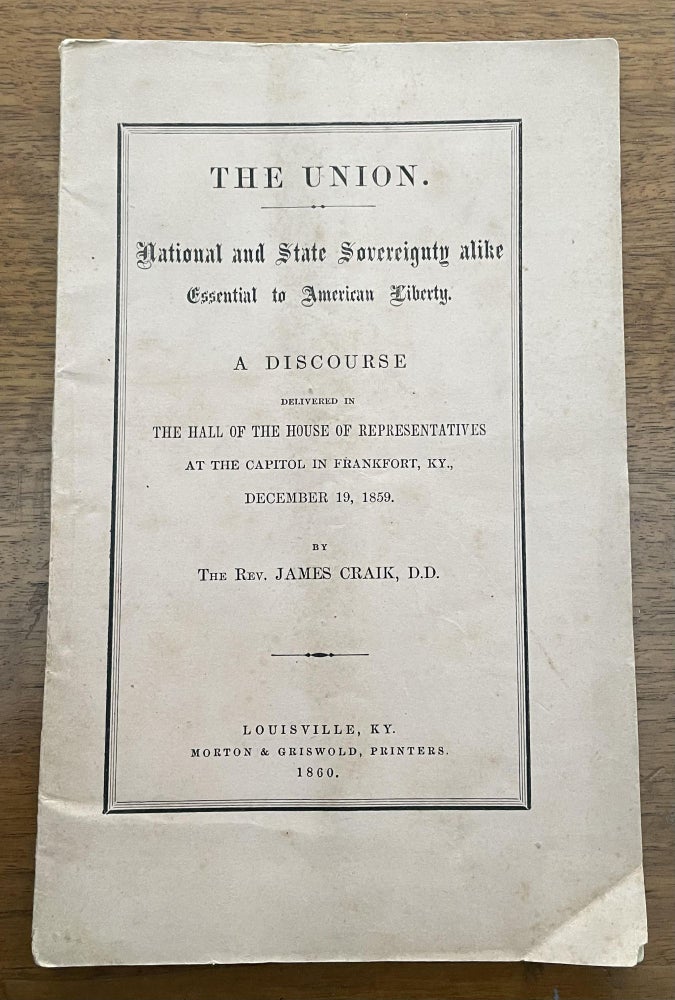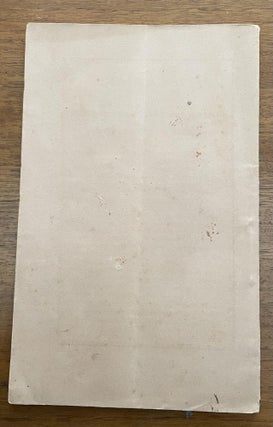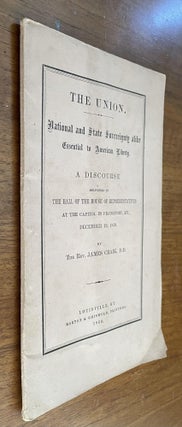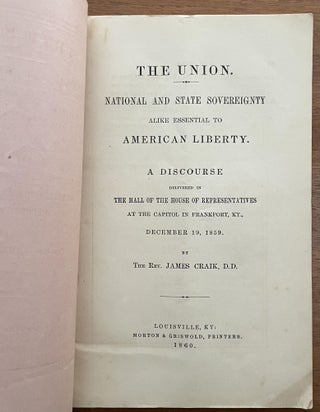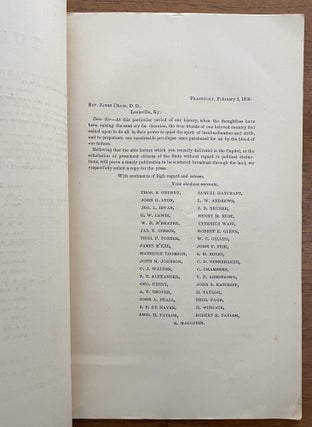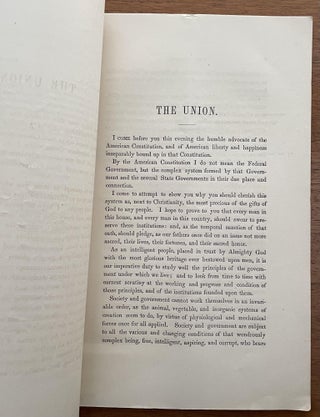National and State Sovereignty alike Essential to American Liberty; A Discourse Delivered in the Hall of the House of Representatives at the Capitol in Frankfort, Ky., December 19, 1859
Louisville, KY: Rev. James D. Craik, D. D.; Morton & Griswold, Printers, 1860. First Edition, First Printing. A Very Good+ copy of the first edition, first printing in the original string-bound wrappers with some spotting and toning, as well as some minor loss to the spine ends and a tiny bit of loss to the lower right corner of the front wrapper and title page. The pamphlet shows a vertical bend line to each wrapper with a consequent bend line to the leaves. A Very Good + copy of this scarce publication.
THE FOLLOWING IS FROM WIKIPEDIA:
James Craik (31 August 1806 – 9 June 1882)[1] was a noted preacher, author, lawyer, and amateur architect. He was born on August 31, 1806, in Alexandria, Virginia to George Washington Craik, secretary to President George Washington during his second term, and Maria Tucker. He was the grandson of Dr. James Craik, President George Washington's physician. He married Juliet Shrewsbury[4] and had eleven children.
Craik wrote extensively on theology. His two best remembered works are Old and New and The Divine Life.[6] In addition to these works being used as textbooks for church schools he was also widely renowned as a preacher.
In his waning years he spoke before the Kentucky Legislature in favor of staying in the Union.
Kentucky was a border state of key importance in the American Civil War. It officially declared its neutrality at the beginning of the war, but after a failed attempt by Confederate General Leonidas Polk to take the state of Kentucky for the Confederacy, the legislature petitioned the Union Army for assistance. After early 1862 Kentucky came largely under Union control. In the historiography of the Civil War, Kentucky is treated primarily as a border state, with special attention to the social divisions during the secession crisis, invasions and raids, internal violence, sporadic guerrilla warfare, federal-state relations, the ending of slavery, and the return of Confederate veterans.
Kentucky was the site of several fierce battles, including Mill Springs and Perryville. It was the arena to such military leaders as Ulysses S. Grant on the Union side, who first encountered serious Confederate gunfire coming from Columbus, Kentucky, and Confederate cavalry leader Nathan Bedford Forrest. Forrest proved to be a scourge to the Union Army in western Kentucky, even making an attack on Paducah. Kentuckian John Hunt Morgan further challenged Union control, as he conducted numerous cavalry raids through the state.
Kentucky was the birthplace of Abraham Lincoln, his wife Mary Todd, and his southern counterpart, Confederate President Jefferson Davis. Lincoln had declared, early in the war, "I think to lose Kentucky is nearly the same as to lose the whole game."
35,000 Kentuckians served as Confederate soldiers; an estimated 125,000 Kentuckians served as Union soldiers. Approximately 24,000 Black Kentuckians, free and enslaved, served as Union soldiers.
Kentucky's citizens were split regarding the issues central to the Civil War. In 1860, slaves composed 19.5% of the Commonwealth's population, and many Unionist Kentuckians saw nothing wrong with the "peculiar institution".
Kentucky was strategically important to both the North and South.
Instead, most Kentuckians favored John J. Crittenden's position that the Commonwealth should act as a mediator between the two sides.[15] To that end, both houses of the General Assembly passed declarations of neutrality, a position officially declared by Governor Magoffin on May 20, 1861. Item #3447
Price: $250.00

